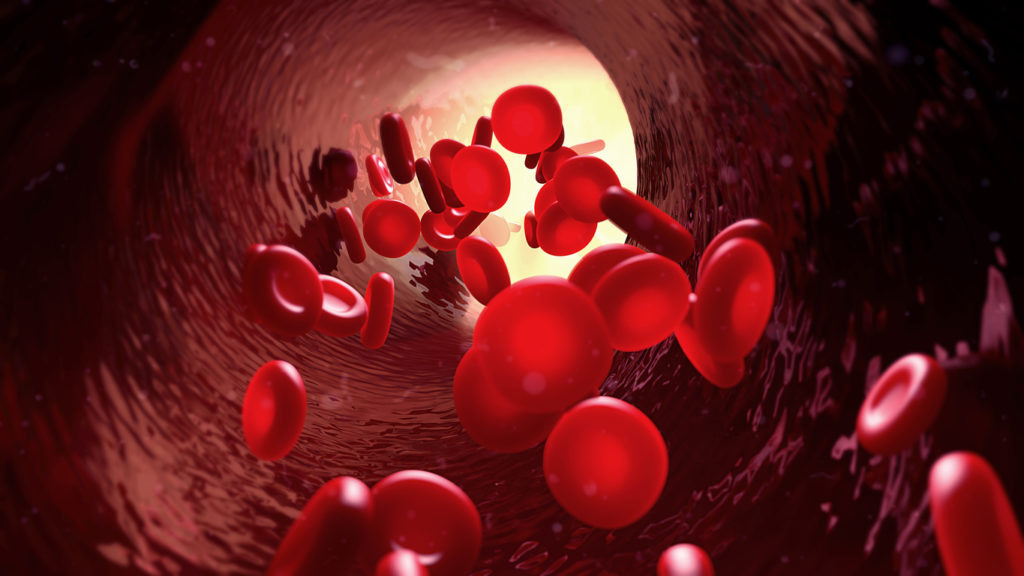One of the complications of late stage kidney disease is the development of a low red blood cell count (anaemia/low haemoglobin concentration). The Australian Commonwealth government limits funding of medications (called erythropoietic stimulating agents) to those patients who have already developed anaemia.There is evidence supporting the beneficial effects of maintaining a higher haemoglobin in these patients. Higher haemoglobin can delay the onset of dialysis and reduce the development of heart enlargement. However, the administration of erythropoietic stimulating agents is not without risk, including a high financial burden, worsening of high blood pressure and a rare complication called pure red cell aplasia.Previous studies have shown that patients with chronic kidney disease require additional iron to maintain the production of red blood cells. Thus it would be timely to determine if the administration of iron sucrose to these patients can maintain a near normal haemoglobin concentration, without the need to start an erythropoietic stimulating agent and possibly delaying dialysis.Study Hypothesis: That administration of iron sucrose is superior to standard care in the prevention of anaemia in patients with stage 3 /4 kidney disease.
Official Title
Assessment of the Use of Intravenous Iron Sucrose to Maintain Haemoglobin Levels and Delay the Onset of Use of Erythropoietic Agents and/or Dialysis in Stage 3/4 Chronic Kidney Disease.
Conditions
- Kidney Failure
- Anaemia
Study Type
Interventional
Study Design
Treatment, Randomised, Open Label, Active Control, Parallel Assignment, Safety/Efficacy Study.
Further Details
-
The primary endpoint will be the change in Hb concentration at 12 months or termination (dialysis, commencement of an ESA). Minimum permitted enrolment is 6 months.
-
The secondary endpoints will be the change in renal function (calculated creatinine clearance), the quality of life, the time taken to dialysis, the time from randomization to the requirement of an ESA and the number of hospitalization days.
Study Start
August 2004
Eligibility & Criteria
-
Ages Eligible for Study: 18 years to 80 years
-
Genders Eligible for Study: Both
-
Accepts Healthy Volunteers: No
Inclusion Criteria:
- Initial Hb concentrations ≥ 110g/L (males and females)
- Calculated GFR ≤ 35mL/min (≤ 50mL/min for diabetics)
- Demonstration of a clinically significant rise in creatinine and/or a drop in Hb concentration in the previous 18 months. If such data are not available, the investigator will make a decision regarding eligibility based on the clinical circumstances.
Exclusion Criteria:
- Age > 80
- Pregnancy
- Unstable ischaemic heart disease
- Uncontrolled, severe, congestive cardiac failure
- Haemochromatosis or iron overload* (ferritin >300µg/L and TSAT >25%)
- Liver failure
- Myelodysplastic syndromes or monoclonal gammopathies
- Active malignancy or gastrointestinal bleeding
- Persistent sepsis or significant chronic inflammation (CRP > 25)
- Iron deficiency (Ferritin <30ug/L and Tsat <15%)or other haematinic disorder
- Active and significant haemolysis
- Previous organ transplantation
- Concurrent or significant past (>6 months) immuno-suppression
- Adult polycystic kidney disease
- Current use of an ESA
- On dialysis: patients can still be considered eligible after condition is reversed or treated.
Total Enrolment
120
Contact Details
Principal Investigator:
Lawrence P McMahon, MD
Melbourne Health
Locations:
Australia, New South Wales
Central Coast Health
Gosford, New South Wales
Australia, 2250Royal North Shore Hospital
St Leonards, New South Wales
Australia, 2065
Australia, Queensland
Royal Brisbane & Women’s Hospital
Herston, Queensland
Australia, 4006Australia, Victoria
The Royal Melbourne Hospital
Melbourne, Victoria
Australia, 3050Monash Medical Centre
Clayton, Victoria
Australia, 3168Australia, Western Australia
Royal Perth Hospital
Perth, Western Australia
Australia, 6847
All content and media on the HealthEngine Blog is created and published online for informational purposes only. It is not intended to be a substitute for professional medical advice and should not be relied on as health or personal advice. Always seek the guidance of your doctor or other qualified health professional with any questions you may have regarding your health or a medical condition. Never disregard the advice of a medical professional, or delay in seeking it because of something you have read on this Website. If you think you may have a medical emergency, call your doctor, go to the nearest hospital emergency department, or call the emergency services immediately.







